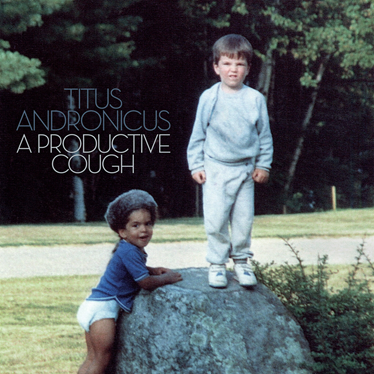A PRODUCTIVE COUGH by Titus Andronicus

Genre: Pub Rock, Heartland Rock
Favorite Tracks: “Real Talk,” “Number One (In New York),” “Home Alone”
A few months ago, as we were preparing for the turning of the calendar from 2017 to ‘18, I started to think of the kinds of albums I wanted to hear this year. The political climate is driving us all crazy, and I really wish I could stop writing that in my reviews, but here we are in what I hope will be the most turbulent times I ever experience. It felt natural to assume that, given some time to get angry and then to process that anger, we’d see music move back towards being explicitly political, rather than taking the “personal is political” approach that has hung over most music genres over the past few years. I felt relatively sure that more populist-oriented and hyper-sincere music would emerge in droves, and so far that hypothesis has been supported.
Titus Andronicus wasn’t the first band I thought of, but they definitely fall into this camp, being (at least previously) a fusion of dumpster-diver punk with earnest melodies and classic rock tropes. There is a bit of a shift in focus on their latest album, A PRODUCTIVE COUGH, that makes it an interesting concept. It’s not as dramatic a shift as some have made it out to be, but Titus Andronicus seems to have removed focus on “performance,” opting instead to lean further into a communal, band-in-a-pub type of vibe. It’s a look that fits them well, and joining in their collective singalong seems like it would be a lot of fun live, but A PRODUCTIVE COUGH is, despite the collectivist spirit at its heart, just not very engaging on record.
One thing that Titus Andronicus carries over from previous albums is that they definitely prefer to let their songs breathe—this is a seven-track record that takes 46 minutes to get through. Generally, this has worked for them in the past, and it continues to work in their favor on A PRODUCTIVE COUGH. This is especially true for album opener “Number One (In New York),” the most Titus Andronicus-y song on this record and one of its highlights. Over the course of eight minutes, the song spirals outward around a simple and heartland-ish piano melody with a theatricality that seems to run counter to the goals of the rest of the record, but is welcome nonetheless. It then devolves into the shuffling “Real Talk,” a lengthy pub sing-along that bears a passing resemblance to Pink Floyd’s “Free Four.” “Real Talk” is just a fun freaking song. It’s fun to listen to, it’s fun to sing along to, and it’s fun to imagine being in the room with those horns and squealing guitars as the whole thing evolves into a giant hootenanny. And it’s pretty obvious this one’s about Trump, but it’s the best kind of Trump song for these times. Even though it’s incredibly repetitive and won’t suit everyone’s fancy, there’s a real catharsis to be found in singing along with lyrics like, “If things are as bad as the newspaper says / we’re in for a real big war.” It’s absolutely fucking grim, but sometimes that’s what you need in a time like this.
The rest of the album is where where we begin to see the struggles. “Above the Bodega (Local Business)” isn’t able to bridge over the excitement of “Real Talk,” and it kills the momentum that they build up with it with a dull instrumental approach. By itself, it’s not a bad tune at all, with compelling but bizarre lyrics about a watchful shopkeeper, but the letdown is undeniable. It continues with “Crass Tattoo,” a sort-of-Irish ballad that fails to go any particular direction despite being well performed. We’re then treated to a reworking of “Like A Rolling Stone” which is fun to listen to, but the intent of its inclusion is frankly baffling. Titus Andronicus’ take on it is slightly more Stones than the original, with a looser feel and new lyrics written by frontman Patrick Stickles. The rewrite isn’t bad, but the initial shock of the whole experience makes the first listen feel like some sort of cheap trick. “Home Alone,” at least from a songwriting perspective, calls to mind THE SUBURBS-era Arcade Fire run through a much, much looser style of performance. This is one of the better songs on the album as well, but at eight minutes, it fails to justify being even half that long. “Mass Transit Madness (Goin’ Loco’)” feels like a sort of spiritual successor to “Number One,” taking on a similar dynamic structure and theme and wrapping the album up in a slightly untidy, urban cowboy-ish bow.
A PRODUCTIVE COUGH will likely not make many year-end lists, but what’s really admirable about Titus Andronicus’ approach is that they’re digging back into a fascinating, relatively untapped well of American music. Every asshole with a denim jacket and a guitar worships Bob Dylan just as much as Stickles and Titus Andronicus do, but they may be doing it for the entirely wrong reason. Bob Dylan was a cool and fashionable guy, but he was so much more than those things. He was observant, just like all the great folk singers before him were, and on some level, he cared about what was going on around him and about other people. Americans are far too quick to sell out their own musical culture for some cool points—post-Garth Brooks country is a money-grabbing disaster, and a beautiful and uniquely American tradition of politically minded troubadours carrying indomitable spirits is dying in favor of a group of artists that are so far removed from the context of those aesthetics that they craft it into something more superficial. In a musical world in which audiences, artists, and critics are all getting far too carried away in their pursuit of iconography, Titus Andronicus are proving the opposite. A PRODUCTIVE COUGH is not the band’s strongest record, but it proves without a shadow of a doubt that they have their ear to the ground, and we need more artists like that.
Verdict: Recommend



